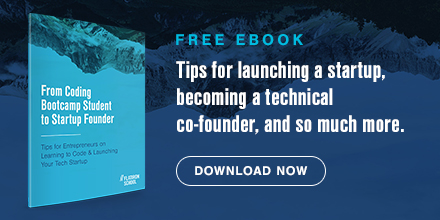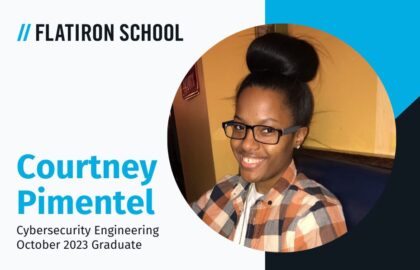Five Tips for Getting into Y Combinator from Flatiron Grads Who Have Done It

Getting into Y Combinator isn’t easy. Each year, more than 1,000 young companies apply to participate in the well-known tech incubator—and it’s estimated that 95% of applicants are rejected. That’s why it’s such a point of pride for us at Flatiron School that seven Flatiron School alumni have gone on to participate in Y Combinator […]
Getting into Y Combinator isn’t easy. Each year, more than 1,000 young companies apply to participate in the well-known tech incubator—and it’s estimated that 95% of applicants are rejected. That’s why it’s such a point of pride for us at Flatiron School that seven Flatiron School alumni have gone on to participate in Y Combinator after finishing our program.Bringing a small startup into a well-known accelerator like Y Combinator or Techstars is more than just a gold star for a company’s reputation; it also gives them valuable access to contacts, specialized advice, and funding that can turbocharge the founders’ futures.Here is some advice from founders who have made it into Y Combinator on how to handle the application process, maximize the odds that your startup makes it in, and make the most of the tremendous opportunity if you do.
1. Optimize Your Application
As Jason Shen of Ridejoy puts it in his unofficial guide to applying to Y Combinator, “Engineer your application (and interview) to optimize for rapidly impressing the YC Partners.” In other words, applicants need to get to the point quickly, give a succinct elevator pitch, and offer a punchy introduction that lets Y Combinator’s team quickly understand your startup.This requires plenty of practice, and honing marketing chops that might not come naturally to founders who primarily worry about product or technology. However, there are an abundance of online resources for applicants looking for best practices for their Y Combinator application—Slideshare and Quora offer excellent starting points.
2. Understand Sales, Marketing, Customers—and All Things Technical
Flatiron School alumnus and current Y Combinator-participant Daniel Barabander of Hay Labs believes applicants have to “avoid the curse of the ‘sidepreneur.’ Do not expect that you can build a successful company on the side. I used to think that I could take a job, work on an app on the side until it took off, and everything would be perfect, but it doesn’t work like that. No risk, only reward.” Instead, he says, entrepreneurs need to devote their full energy to their fledgling startups—and understand every aspect of the business, no matter what they are working on.
3. Expect the Unexpected
Statuspage.io’s Danny Olinsky, a Flatiron School alumnus who went on to attend Y Combinator, says, “Learning to program is tough. In the beginning, it takes a lot of hours to get to a place where everything you have learned starts to make sense. But, little by little, the pieces fit together. It’s hard when you’re in the weeds and have no idea what’s going on, but you have to trust that learning is going to get easier. Suddenly, you’ll see results, and it starts to feel really good.”Olinsky notes that it’s important to build on this momentum because “eventually, you will hit another plateau. The only way to keep learning is to keep challenging yourself—whether that means digging deeper into computer science foundations, dedicating time to level up on front-end skills, investigating hardware hacking, or anything else.
4. Hone Your Technical Skills
Olinsky adds, “Anyone building a technical startup absolutely needs to understand the problems at hand and be able to relate to people—specifically developers—on a technical level. This doesn’t mean you need to be Director of Ops or a senior engineer, but it does mean you need to understand how a Sidekiq backup could lead to delays in user notifications.”This carries on into accelerators like Y Combinator as well. Even if you aren’t a technical founder and are more focused on product, there’s a clear expectation that you can “speak tech” and know how development and engineering teams do their jobs.When applying to Y Combinator or a similar accelerator, it’s critical that you have a technical co-founder. Many Y Combinator alumni have said that the accelerator puts a high premium on technical experience when deciding which founders receive invitations to participate.
5. Be Persistent
Paul Graham, the founder of Y Combinator, notes, “A lot of our founders were surprised how important persistence was in startups. It was both a negative and a positive surprise: they were surprised both by the degree of persistence required and also by the degree to which persistence alone was able to dissolve obstacles.”The application process for Y Combinator is a difficult and strenuous one that, by some metrics, is more difficult than getting into Harvard. By being prepared and reserving energy for the process ahead, your chances of progressing in the application process and being accepted can be much improved.
For more advice on launching your startup from Flatiron-bred entrepreneurs making a big impact in the tech world, download our new ebook, From Coding Bootcamp to Startup Founder: Tips for Entrepreneurs on Learning to Code & Launching a Tech Startup below!

Disclaimer: The information in this blog is current as of August 23, 2016. Current policies, offerings, procedures, and programs may differ.



